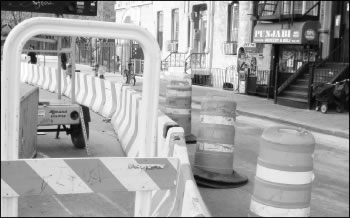By Lilly O’Donnell
Curry worries
as a project may
drive off cabbies
Punjabi Grocery & Deli, a hole-in-the-wall place down a flight of stairs on E. First St., has been serving simple, hearty, vegetarian Indian food at no more than $3 a bowl for 19 years.
However, E. First St. between First Ave. and Avenue A is currently under construction, preventing parking in front of the 24-hour cabstand restaurant, which makes most of its money from taxi drivers. Surinder Singh, who has worked at Punjabi for 14 years and is the owner’s younger brother, estimated that their customers are “70 percent cab driver, 30 percent everybody else.”
Harsh Vardhan, a hack who has been going to Punjabi for lunch since he started driving a taxi in 1993, admitted that he would probably stop going there if he couldn’t park out front anymore.
“Taxi drivers are looking for somewhere to park,” he said with a shrug. “If there’s nowhere to park, we’ll go somewhere else.”
Rakash Roy, another cabbie and Punjabi regular, agreed that no matter how much drivers might like a place and want it to stay in business, at the end of the day, it comes down to where they can park to eat.
“Nothing else we can do,” he said. “It’s not a lunch break if we are driving while we eat.”
“Construction is expected to take three years and be completed in the summer of 2013,” said Craig Chin, a spokesperson for the city’s Department of Design and Construction. Chin explained that the project was undertaken “to improve pedestrian, vehicular and bicyclist circulation and safety while also making infrastructure improvements.” In short, work will be done on water mains and sewers, and the crosswalk will be made more distinct from the street at this previously dangerous intersection.
With parking limited, the cabstand will have to rely more heavily on their other customers, the “30 percent everybody else.” Locals often buy bowls of rice and curry or samosas, then sit eating them outside on the adjacent stoops — but during the winter that’s a less viable option. Seating inside is extremely limited (two stools at a narrow counter next to the bathroom), making it difficult to buy food from Punjabi without having somewhere warm to sit and eat it — like a taxicab, for example.
“For my business it’s a very big problem,” said Singh, clearly concerned.
Punjabi’s bottom line hasn’t been as affected by the recession as much as most, since cheap meals are in even higher demand than usual. But now, with the long-term project disrupting the street, they’re bracing themselves for a drastic drop in business over the next three years.
































